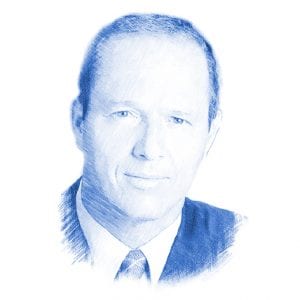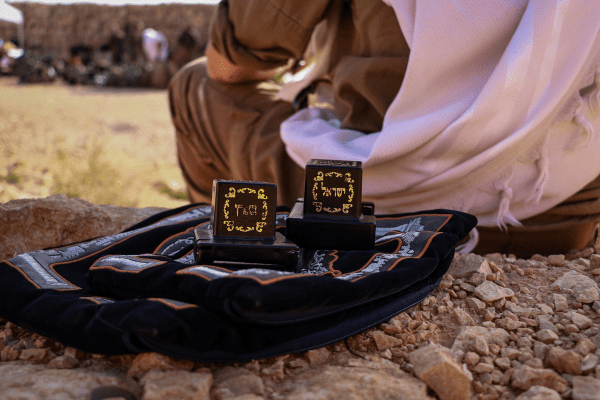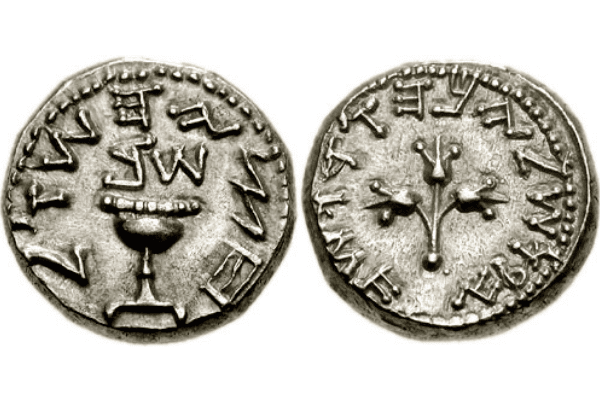
TORAH
NEVI'IM
KETUVIM
II - Chapter 9
Translation and Transliteration of
Listen to this chapter in Hebrew:
- Commentary
- Buy E-book
- Buy the Israel Bible
1David inquired, “Is there anyone still left of the House of Shaul with whom I can keep faith for the sake of Yehonatan?”
אוַיֹּאמֶר דָּוִד הֲכִי יֶשׁ־עוֹד אֲשֶׁר נוֹתַר לְבֵית שָׁאוּל וְאֶעֱשֶׂה עִמּוֹ חֶסֶד בַּעֲבוּר יְהוֹנָתָן׃
2There was a servant of the House of Shaul named Ziba, and they summoned him to David. “Are you Ziba?” the king asked him. “Yes, sir,” he replied.
בוּלְבֵית שָׁאוּל עֶבֶד וּשְׁמוֹ צִיבָא וַיִּקְרְאוּ־לוֹ אֶל־דָּוִד וַיֹּאמֶר הַמֶּלֶךְ אֵלָיו הַאַתָּה צִיבָא וַיֹּאמֶר עַבְדֶּךָ׃
3The king continued, “Is there anyone at all left of the House of Shaul with whom I can keep faith as pledged before Hashem?” Ziba answered the king, “Yes, there is still a son of Yehonatan whose feet are crippled.”
גוַיֹּאמֶר הַמֶּלֶךְ הַאֶפֶס עוֹד אִישׁ לְבֵית שָׁאוּל וְאֶעֱשֶׂה עִמּוֹ חֶסֶד אֱלֹהִים וַיֹּאמֶר צִיבָא אֶל־הַמֶּלֶךְ עוֹד בֵּן לִיהוֹנָתָן נְכֵה רַגְלָיִם׃
4“Where is he?” the king asked, and Ziba said to the king, “He is in the house of Machir son of Ammiel, in Lo-debar.”
דוַיֹּאמֶר־לוֹ הַמֶּלֶךְ אֵיפֹה הוּא וַיֹּאמֶר צִיבָא אֶל־הַמֶּלֶךְ הִנֵּה־הוּא בֵּית מָכִיר בֶּן־עַמִּיאֵל בְּלוֹ דְבָר׃
5King David had him brought from the house of Machir son of Ammiel, at Lo-debar;
הוַיִּשְׁלַח הַמֶּלֶךְ דָּוִד וַיִּקָּחֵהוּ מִבֵּית מָכִיר בֶּן־עַמִּיאֵל מִלּוֹ דְבָר׃
6and when Mefiboshet son of Yehonatan son of Shaul came to David, he flung himself on his face and prostrated himself. David said, “Mefiboshet!” and he replied, “At your service, sir.”
ווַיָּבֹא מְפִיבֹשֶׁת בֶּן־יְהוֹנָתָן בֶּן־שָׁאוּל אֶל־דָּוִד וַיִּפֹּל עַל־פָּנָיו וַיִּשְׁתָּחוּ וַיֹּאמֶר דָּוִד מְפִיבֹשֶׁת וַיֹּאמֶר הִנֵּה עַבְדֶּךָ׃
7David said to him, “Don't be afraid, for I will keep faith with you for the sake of your father Yehonatan. I will give you back all the land of your grandfather Shaul; moreover, you shall always eat at my table.”
זוַיֹּאמֶר לוֹ דָוִד אַל־תִּירָא כִּי עָשֹׂה אֶעֱשֶׂה עִמְּךָ חֶסֶד בַּעֲבוּר יְהוֹנָתָן אָבִיךָ וַהֲשִׁבֹתִי לְךָ אֶת־כָּל־שְׂדֵה שָׁאוּל אָבִיךָ וְאַתָּה תֹּאכַל לֶחֶם עַל־שֻׁלְחָנִי תָּמִיד׃
8[Mefiboshet] prostrated himself again, and said, “What is your servant, that you should show regard for a dead dog like me?”
חוַיִּשְׁתַּחוּ וַיֹּאמֶר מֶה עַבְדֶּךָ כִּי פָנִיתָ אֶל־הַכֶּלֶב הַמֵּת אֲשֶׁר כָּמוֹנִי׃
9The king summoned Ziba, Shaul's steward, and said to him, “I give to your master's grandson everything that belonged to Shaul and to his entire family.
טוַיִּקְרָא הַמֶּלֶךְ אֶל־צִיבָא נַעַר שָׁאוּל וַיֹּאמֶר אֵלָיו כֹּל אֲשֶׁר הָיָה לְשָׁאוּל וּלְכָל־בֵּיתוֹ נָתַתִּי לְבֶן־אֲדֹנֶיךָ׃
10You and your sons and your slaves shall farm the land for him and shall bring in [its yield] to provide food for your master's grandson to live on; but Mefiboshet, your master's grandson, shall always eat at my table.”—Ziba had fifteen sons and twenty slaves.—
יוְעָבַדְתָּ לּוֹ אֶת־הָאֲדָמָה אַתָּה וּבָנֶיךָ וַעֲבָדֶיךָ וְהֵבֵאתָ וְהָיָה לְבֶן־אֲדֹנֶיךָ לֶּחֶם וַאֲכָלוֹ וּמְפִיבֹשֶׁת בֶּן־אֲדֹנֶיךָ יֹאכַל תָּמִיד לֶחֶם עַל־שֻׁלְחָנִי וּלְצִיבָא חֲמִשָּׁה עָשָׂר בָּנִים וְעֶשְׂרִים עֲבָדִים׃
11Ziba said to the king, “Your servant will do just as my lord the king has commanded him.” “Mefiboshet shall eat at my table like one of the king's sons.”
יאוַיֹּאמֶר צִיבָא אֶל־הַמֶּלֶךְ כְּכֹל אֲשֶׁר יְצַוֶּה אֲדֹנִי הַמֶּלֶךְ אֶת־עַבְדּוֹ כֵּן יַעֲשֶׂה עַבְדֶּךָ וּמְפִיבֹשֶׁת אֹכֵל עַל־שֻׁלְחָנִי כְּאַחַד מִבְּנֵי הַמֶּלֶךְ׃
12Mefiboshet had a young son named Mica; and all the members of Ziba's household worked for Mefiboshet.
יבוְלִמְפִיבֹשֶׁת בֵּן־קָטָן וּשְׁמוֹ מִיכָא וְכֹל מוֹשַׁב בֵּית־צִיבָא עֲבָדִים לִמְפִיבֹשֶׁת׃
13Mefiboshet lived in Yerushalayim, for he ate regularly at the king's table. He was lame in both feet.
um-fee-VO-shet yo-SHAYV bee-ru-sha-LA-yim KEE al shul-KHAN ha-ME-lekh ta-MEED HU o-KHAYL v'-HU fi-SAY-akh sh'-TAY rag-LAV
יגוּמְפִיבֹשֶׁת יֹשֵׁב בִּירוּשָׁלִַם כִּי עַל־שֻׁלְחַן הַמֶּלֶךְ תָּמִיד הוּא אֹכֵל וְהוּא פִּסֵּחַ שְׁתֵּי רַגְלָיו׃
![]() 9:13 Mefiboshet lived in Yerushalayim
9:13 Mefiboshet lived in Yerushalayim

Nir Barkat (b. 1959)
For the sake of his beloved friend Yehonatan, King David gives Mefiboshet a place at his table in the royal palace in Yerushalayim. As Yerushalayim is the city of peace, it stands to reason that this is the place where King David made such a peaceful gesture. Hashem intends for Yerushalayim to be a place where all of Israel will be content with one another. To that end, the holy capital city is not the property of any one tribe. Rather, it belongs to the entire nation, and is the eternal religious and political center of the entire Jewish people. Nir Barkat, mayor of Jerusalem, emphasized this idea in an article he published in honor of Jerusalem Day. He wrote, “My vision for the future of the city of Jerusalem is rooted in the past. Three thousand years ago, the Land of Israel was divided into allotments for each of the twelve tribes — except for the city of Jerusalem. Instead, Jerusalem was designated as a city for all; it was to remain an open, uniting and united capital. Jerusalem became the center of the world, with leadership, innovation and inspiration emanating from the city….Forty-nine years ago, the capital of the Jewish people and the State of Israel were reunited, allowing the city to live up to its promise as a center for all people, with respect toward all religions….A united Jerusalem is the only viable option for a vibrant and thriving Jerusalem. This is our future. This is Jerusalem.”







